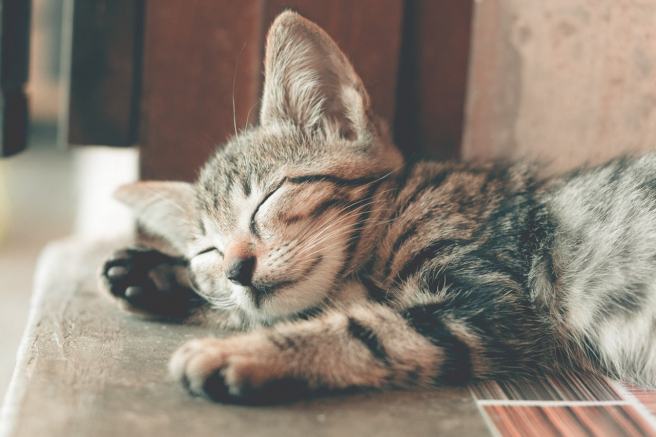2017 Ig Nobel Prize honors cats' fluid dynamics, study on why old men have big ears, and more

The Ig Nobel Prizes honor “research that makes people laugh and then think.” Marc Abrahams, editor of the Annals of Improbable Research, founded this prize in 1991, which honors the most unusual and imaginative achievements. According to the Ig Nobel website, the main goal of the prize is to spur people’s curiosity and to raise the question: “How do you decide what's important and what's not, and what's real and what's not—in science and everywhere else?” This year ten prizes were handed out for research in various fields. Below is the list of the research projects that were honored in a ceremony in Boston:
1. Are cats both solid and liquid?
The Physics Prize was handed to Marc-Antoine Fardin, “for using fluid dynamics to probe the question "Can a Cat Be Both a Solid and a Liquid?"
Reference: "On the Rheology of Cats," Marc-Antoine Fardin, Rheology Bulletin, vol. 83, 2, July 2014, pp. 16-17 and 30.
2. Playing didgeridoo to help with snoring and sleep apnea
The Peace Prize was awarded to Milo Puhan, Alex Suarez, Christian Lo Cascio, Alfred Zahn, Markus Heitz, and Otto Braendli, “for demonstrating that regular playing of a didgeridoo is an effective treatment for obstructive sleep apnea and snoring.”
Reference: "Didgeridoo Playing as Alternative Treatment for Obstructive Sleep Apnoea Syndrome: Randomised Controlled Trial," Milo A. Puhan, Alex Suarez, Christian Lo Cascio, Alfred Zahn, Markus Heitz and Otto Braendli, BMJ, vol. 332 December 2006.
3. How contact with a crocodile can affect willingness to gamble
The Economics Prize was given to Matthew Rockloff and Nancy Greer, “for their experiments to see how contact with a live crocodile affects a person's willingness to gamble.”
Reference: "Never Smile at a Crocodile: Betting on Electronic Gaming Machines is Intensified by Reptile-Induced Arousal," Matthew J. Rockloff and Nancy Greer, Journal of Gambling Studies, vol. 26, no. 4, December 2010, pp. 571-81.
4. Is there a reason old men have big ears?
The Anatomy Prize went to James Heathcote, “for his medical research study "Why Do Old Men Have Big Ears?"”
Reference: "Why Do Old Men Have Big Ears?" James A. Heathcote, British Medical Journal, vol. 311, 1995, p. 1668.
5. Discovery of a cave insect with mixed sexes
The Biology Prize was given to Kazunori Yoshizawa, Rodrigo Ferreira, Yoshitaka Kamimura, and Charles Lienhard, “for their discovery of a female penis, and a male vagina, in a cave insect.”
Reference: "Female Penis, Male Vagina and Their Correlated Evolution in a Cave Insect," Kazunori Yoshizawa, Rodrigo L. Ferreira, Yoshitaka Kamimura, Charles Lienhard, Current Biology, vol. 24, no. 9, 2014, pp. 1006-1010.
6. What happens when you walk backwards with a cup of coffee?
The Fluid Dynamics Prize was awarded to Jiwon Han, “for studying the dynamics of liquid-sloshing, to learn what happens when a person walks backwards while carrying a cup of coffee.”
Reference: "A Study on the Coffee Spilling Phenomena in the Low Impulse Regime," Jiwon Han, Achievements in the Life Sciences, vol. 10, no. 1, 2016, pp. 87-101.
7. When vampire bats include human blood in their diet
The Nutrition Prize was given to Fernanda Ito, Enrico Bernard, and Rodrigo Torres, “for the first scientific report of human blood in the diet of the hairy-legged vampire bat.”
Reference: "What is for Dinner? First Report of Human Blood in the Diet of the Hairy-Legged Vampire Bat Diphylla ecaudata," Fernanda Ito, Enrico Bernard, and Rodrigo A. Torres, Acta Chiropterologica, vol. 18, no. 2, December 2016, pp. 509-515.
8. A study on people disgusted by cheese
The Medicine Prize went to Jean-Pierre Royet, David Meunier, Nicolas Torquet, Anne-Marie Mouly and Tao Jiang “for using advanced brain-scanning technology to measure the extent to which some people are disgusted by cheese.”
Reference: "The Neural Bases of Disgust for Cheese: An fMRI Study," Jean-Pierre Royet, David Meunier, Nicolas Torquet, Anne-Marie Mouly and Tao Jiang, Frontiers in Human Neuroscience, vol. 10, October 2016, article 511.
9. Twins cannot recognize their face
The Cognition Prize was handed to Matteo Martini, Ilaria Bufalari, Maria Antonietta Stazi, and Salvatore Maria Aglioti, “for demonstrating that many identical twins cannot tell themselves apart visually.”
Reference: "Is That Me or My Twin? Lack of Self-Face Recognition Advantage in Identical Twins," Matteo Martini, Ilaria Bufalari, Maria Antonietta Stazi, Salvatore Maria Aglioti, PLoS ONE, vol. 10, no. 4, 2015: e0120900.
10. The best way to play music to human fetus
The Obstetrics Prize went to Marisa López-Teijón, Álex García-Faura, Alberto Prats-Galino, and Luis Pallarés Aniorte, “for showing that a developing human fetus responds more strongly to music that is played electromechanically inside the mother's vagina than to music that is played electromechanically on the mother's belly.”
Reference: "Fetal Facial Expression in Response to Intravaginal Music Emission," Marisa López-Teijón, Álex García-Faura, and Alberto Prats-Galino, Ultrasound, November 2015, vol. 23, no. 4, pp. 216–223.
"Fetal Acoustic Stimulation Device," patent ES2546919B1, granted September 29, 2015 to Luis y Pallarés Aniorte and Maria Luisa López-Teijón Pérez.
Congratulations to all the winners!
You can watch the ceremony here:
Related reading:
2016 Ig Nobel Prizes honor research on personality of rocks, pants for rats, and more
Published on: Sep 18, 2017
Comments
You're looking to give wings to your academic career and publication journey. We like that!
Why don't we give you complete access! Create a free account and get unlimited access to all resources & a vibrant researcher community.














